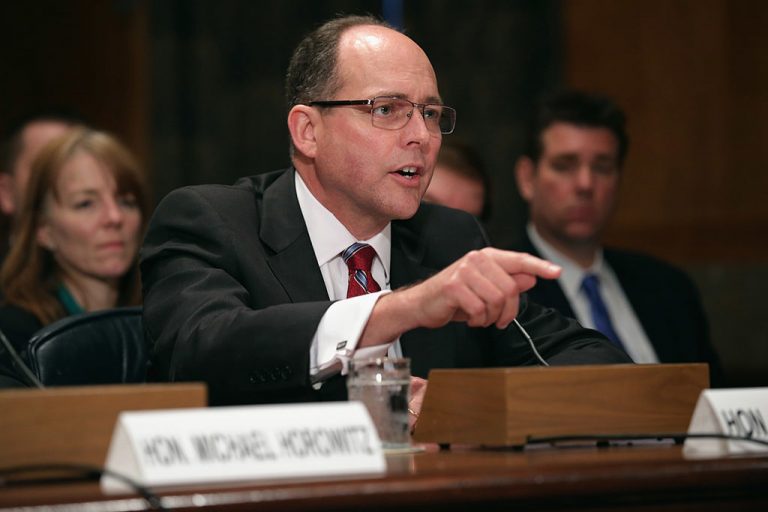As congressional Democrats push ahead with an inquest into the Jan. 6 Capitol Building riots, the Committee’s appointed Staff Director, a former CIA Inspector General, has been found to have a history of retaliating against intelligence community whistleblowers, according to a July 23 report by Yahoo News.
The U.S. House Select Committee to Investigate the January 6th Attack on the United States Capitol has carved itself as an increasingly partisan effort after Speaker Nancy Pelosi (D-CA) vetoed two key Republican Party appointments in Reps. Jim Banks (IN) and Jim Jordan (OH) on July 22.
Background
On May 19, the House of Representatives passed a bill that would have seen the creation of Jan. 6 Commission modeled after the 9/11 Commission formed from 10 non-governmental members, half to be chosen by Democrats and half to be chosen by Republicans. The proposal passed with all Democrats and 35 Republicans voting in favor.
On May 28 the Jan. 6 Commission died in the Senate when it was blocked under the Filibuster agreement, which requires some legislation to earn 60 votes. The final tally was 54-35 with two Democrat and nine Republican abstentions. A familiar chorus of Republicans voted against Party lines in favor of the Commission: Sens. Lisa Murkowski (AK), Rob Portman (OH), Mitt Romney (UT), Bill Cassidy (LA), Susan Collins (ME), and Ben Sasse (NE).
On June 30, the House of Representatives voted to create its own Select Committee to investigate the Capitol riots, passing along party lines by a 220-190 vote. Two Republicans, Adam Kinzinger (IL) and Liz Cheney (WY), crossed the floor and 16 Republicans abstained.
Success
You are now signed up for our newsletter
Success
Check your email to complete sign up
The House Select Committee, which has subpoena powers, allows Pelosi to appoint eight members and House Minority Leader Kevin McCarthy (CA) to appoint five. However, Committee rules require McCarthy’s appointments to be “in consultation” with Pelosi.
Pelosi appointed seven Democrats and one Republican to her side of the Committee:
- Bennie Thompson (D-MS) (Chairperson);
- Zoe Lofgren (D-CA);
- Adam Schiff (D-CA);
- Pete Aguilar (D-CA);
- Stephanie Murphy (D-FL)
- Jamie Raskin (D-MD);
- Elaine Luria (D-VA); and
- Liz Cheney (R-WY).
On July 19, McCarthy submitted his five picks:
- Jim Banks (R-IND) (Ranking Member);
- Jim Jordan (R-OH);
- Rodney Davis (R-IL);
- Kelly Armstrong (R-ND); and
- Troy Nehls (R-TX)
What bipartisan support of the Committee still remained fell apart on July 21 when Pelosi announced she would reject Banks and Jordan’s placements in a vaguely worded statement mentioning only “concern about statements made and actions taken by these Members.” On July 22 at a press conference, Pelosi, still vague, claimed the duo “made statements and took actions that just made it ridiculous to put them on such a committee seeking the truth.”
“When statements are ridiculous and fall into the realm of, ‘You must be kidding,’ there’s no way that they’re going to be on the committee,” she said.
According to speculation by CNBC based on comments given to the outlet by a “a senior Democratic aide familiar with the deliberations,” the issue at hand is Jordan and Banks’s “words and actions stretching over months, some as far back as before the Jan. 6 riot itself and others as recently as this week.”

In a July 19 statement accepting McCarthy’s appointment to the Committee, Banks said “If Democrats were serious about investigating political violence, this committee would be studying not only the January 6 riot at the Capitol, but also the hundreds of violent political riots last summer when many more innocent Americans and law-enforcement officers were attacked.”
“And of course, the committee would not overlook the Good Friday murder of USCP Officer Billy Evans that was perpetrated by a far-left extremist.”
Rep. Cheney continued to defy Republican loyalties as she defended Pelosi’s decision, saying Banks “disqualified himself by his comments over the last 24 hours demonstrating he’s not taking this seriously” in statements to a press scrum.
Cheney also claimed McCarthy was unfit to be House Minority Leader when she said, “I think that any person who would be third in line to the presidency must demonstrate a commitment to the Constitution and a commitment to the rule of law and Minority Leader McCarthy has not done that.”
Banks is notably Ranking Member of the House Judiciary Committee in addition to Chairman of the Republican Study Committee, a group both highly vocal and highly critical of several of President Biden’s positions and policy initiatives, especially regarding Biden’s dovish position on the Chinese Communist Party and appointments of top officials who have historically had public ties and relationships to the CCP.
McCarthy was outspoken after Pelosi’s veto, “I don’t think anybody in America…understand[s] what a sham this committee is and how politically driven [it is] for her to pick and choose who can serve on [the committee]. To say that the ranking member of the judiciary, who would have jurisdiction, cannot serve. When she decides that Jim Banks, who served his nation in the Navy and Afghanistan, that he can’t serve here.”
The Minority Leader rescinded the remaining three appointments, stating, “Unless Speaker Pelosi reverses course and seats all five Republican nominees, Republicans will not be party to their sham process and will instead pursue our own investigation of the facts.”
Pelosi has said she is toying with the idea of appointing Adam Kinzinger, the only other Republican besides Cheney to vote in favor of the Select Committee, in response.
On July 23, the House Freedom Caucus called on McCarthy to attempt a “Motion to Vacate the Chair” that would force the Democrat-controlled House of Representatives to vote on ending Pelosi’s “authoritarian reign” as Speaker.
While the move is clearly very unlikely to succeed, The Hill posits that the Caucus’s call puts McCarthy in a bind as he will need their support if he wants to secure the votes required to become Speaker himself should Republicans win the house in the 2022 primaries, as many pollsters and analysts are speculating.
Staff Director David Buckley
Late on July 23, Yahoo News published an exclusive report about Select Committee Staff Director, former CIA Inspector General David Buckley, being investigated for abuse of an intelligence community whistleblower in 2019.
In a previously unpublished 36-page report by the Department of Homeland Security’s Office of Inspector General (DHS-OIG) dated June 10, 2019, which arose from a complaint filed by former CIA Office of the Inspector General (CIA-OIG) Special Agent Andrew Bakaj, Bakaj alleged Buckley retaliated against him after Bakaj provided information to the Inspector General for the Intelligence Community (IGIC) in 2014.
Bakaj said he was both berated and forbidden from speaking to the IGIC without express permission from Buckley and the CIA-OIG, in addition to material retaliation in the form of forced administrative leave and a suspension of security clearance.
Bakaj chose to retire from the CIA in response to the internal conflict, but gained further clout in the Democrat camp when he served as lead counsel for the whistleblower who alleged former President Donald Trump participated in professional misconduct in his dealings with the Ukraine, a faux-scandal that ultimately led to the failed first impeachment attempt against Trump.
The DHS-OIG’s investigation ruled clearly in favor of Bakaj when it stated, “the evidence establishes that those personnel actions were taken in retaliation for the Complainant’s protected activity.”
Yahoo says a spokesperson for the Select Committee confirmed they were aware of the controversy around Buckley during the hiring process.
Dan Meyer, former IGIC source and whistleblower protection program lead, who could not speak on the Buckley and Bakaj case due to a Non-Disclosure Agreement, but could comment generally on the state of IC whistleblowers during Buckley’s tenure, told Yahoo “The IC whistleblowing program, from 2013 to 2018, received a number of allegations, some substantiated, that inspectors general themselves were engaging in retaliation against their own intelligence officers charged by President Obama and Director [James] Clapper with, ironically, protecting whistleblowers.”
Jason Foster, former Senate Judiciary Committee chief investigative counsel, told Yahoo Buckley’s history was a problem for the integrity of the Select Committee, “No whistleblower is likely to trust someone with a record of opening a retaliatory investigation.”
“The chaos and partisanship infecting the process undermines the committee’s credibility, which has developed into a full-blown dumpster fire at this point.”







